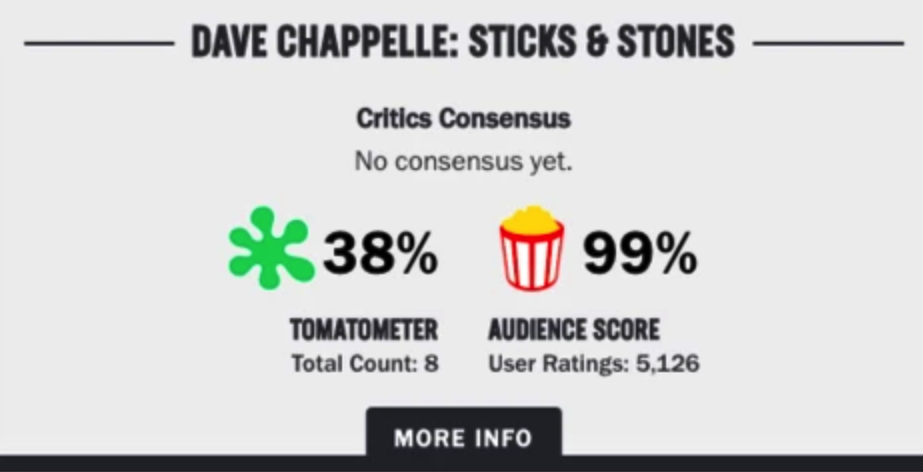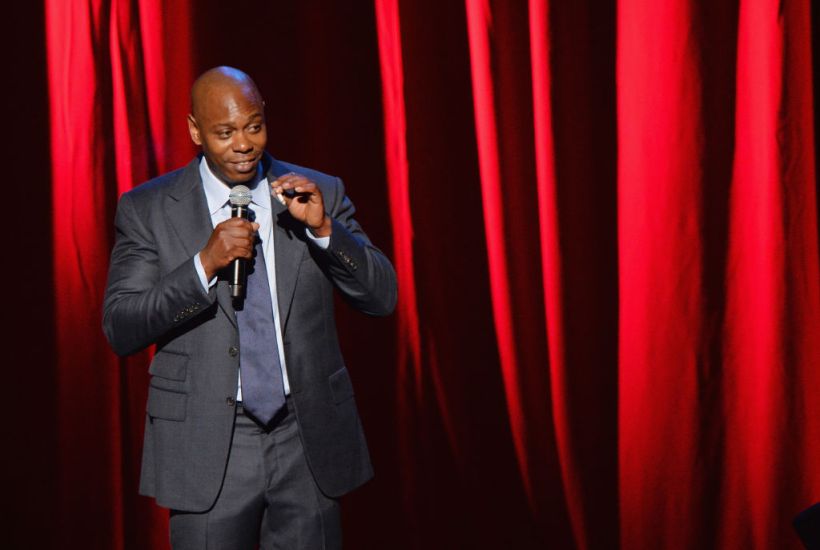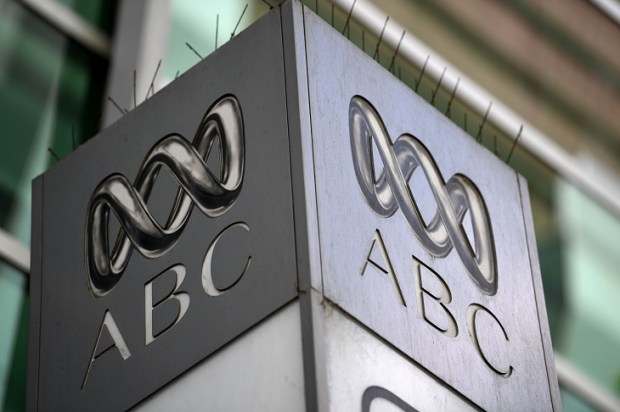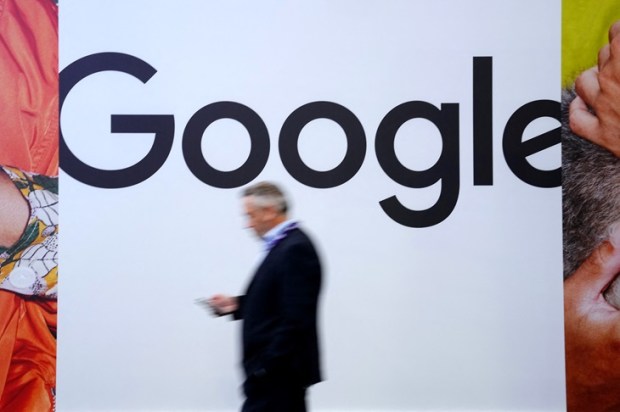Dave Chapelle’s new Netflix Special ‘Sticks and Stones’ could offend just about everybody. There are racist stereotypes, homophobic and transphobic punchlines, cracks at Michael Jackson’s accusers — the works. Predictably, he’s come under fire. A few critics have claimed that their objections aren’t born from being ‘triggered’ but simply from Chapelle missing the mark.
Rotten Tomatoes shows just how out of touch they are with the demos.

While receiving a score of only 38 per cent from eight verified critics on the Tomatometer, it received north of 99 per cent from more than 5,000 users. The disparity is certainly alarming.
Here are some of the highlights
Kyle Smith of the National Review
The set mostly misses the mark. And what is that mark? The Truth?
Chelsea Stewart of Cheatsheet.com
Throughout the program, the comedian delivered a variety of jokes that many have described as misogynstic, homophobic, transphobic and downright exhausting.
David Dennis Jr of Playboy.com
I’m not one who gets offended by comedy. Maybe me being a straight male allows me the privilege to not be offended by Chappelle’s act. So that’s not the reason his jokes about the LGBTQ community don’t work. They’re just not funny.
Comedians are supposed to express the things we can’t or won’t say, poke fun at the many biases people have, and highlight — which isn’t the same as upholding — stereotypes as a way of shining a light on gaps in understanding.
He’s a grown-ass man. And it feels like he keeps making anti-trans and victim-blaming jokes just because he can, which, sure. But why not strive to be more interesting, more original, more thoughtful?
The critics’ mistake is to assume that it’s the comedian’s job to tell the often unsayable truths and reveal the absurdity of social norms. They should be reminded that the audience isn’t there to hear poignant observations about our shared human experience, or to embark on a journey of self-discovery and illumination. The audience is there to laugh. The truth, although a powerful tool, is a means to an end. It is not the destination itself.
A Chapelle critic’s argument follows a basic three-step progression:
- I’m not offended by comedy (establishing critical bona fides);
- I was offended by Dave Chapelle (The most logical and morally virtuous reaction);
- Chapelle wasn’t funny and I’m not the problem (Chapelle needs to change);
So there is a snobbery in much of the Chapelle criticism. Taylor Hosking, who authored the article “You can definitely skip Dave Chapelle’s New Netflix Special” tweeted “Who would have thought that transphobic jokes would be the hill that such a smart talented comedian needs to die on?”
The idea that a comedian can only make jokes about certain groups is not a criticism, but a personal belief. It’s a projection of relative morality, where those who are perceived as vulnerable must be protected at all costs from any ridicule, even the joking kind.
Hosking attempts to qualify her criticism, distancing herself from the animosity beneath her criticisms by praising Chapelle as “smart, talented.” She and other critics want us to believe they are normally ambivalent, a fan of Dave Chapelle and Comedy in General, but this time Chapelle just crossed the line. What is deliberately missed is that until we treat all groups as equal, we practice the discrimination which she so vehemently rejects.
Creating a sacred cow out of select communities, despite Chapelle routinely demolishing almost all ethnicities and orientations, is to assume that somehow these communities are so devoid of comedic understanding and appreciation that Chapelle’s jokes become beyond the pale.
Panning shots show that an incredibly diverse audience were in hysterics for almost the entirety of the special. And while Taylor is more than entitled to say she finds the jokes unfunny, she cannot claim to rise above the perils of discrimination whilst shielding particular communities from social cohesion. Because that’s what comedy does. Laughter brings people together.
And that’s what’s so great about comedy. Besides distracting us for a fleeting moment from the horrors and demons we encounter, there is a precision involved that’s absent in other forms of artistic expression. While paintings and sculptures are open to interpretation, the comic tries to induce the exact same reaction from his audience at the same time. The comedian has to make them laugh. It’s thus a binary proposition and a noble pursuit.
So perhaps, ironically, both Chapelle’s performance and subsequent criticism reinforces something universal — the world is much more bearable when people like Chapelle can say whatever they think will make us laugh.
Alexander Cameron is a Sydney University finance and banking graduate. You can find more from him and his two brothers at www.carnagehouseproductions.com.
Got something to add? Join the discussion and comment below.
Got something to add? Join the discussion and comment below.
Get 10 issues for just $10
Subscribe to The Spectator Australia today for the next 10 magazine issues, plus full online access, for just $10.


























Comments
Don't miss out
Join the conversation with other Spectator Australia readers. Subscribe to leave a comment.
SUBSCRIBEAlready a subscriber? Log in